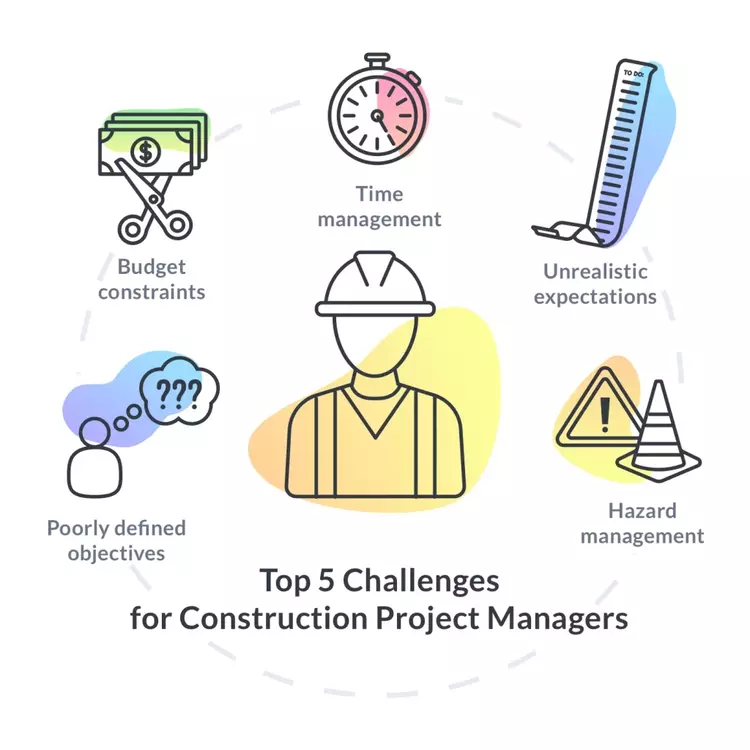Analysis

Taking charge of a building project is no easy task. A construction project might run into a lot of difficulties. Project managers face numerous difficulties because of the project’s broad scope, many participants, and inherent hazards. It is the responsibility of project managers to maintain a site’s efficiency, safety, timeliness, and budget. This request can be very challenging at times. Here are a few challenges project managers regularly deal with in the building industry.
One survey claims that 77% of construction projects have severe delays and that 98% of projects come in over budget.
Shortage of Skilled Labour
Despite advancements in technology, manual labour still dominates the construction sector. However, several factors are exerting pressure on construction firms as they try to recruit competent labour. These are most frequently:
As workers retire, the ageing workforce depletes the sector’s present skills.
Younger generations don’t find the construction industry to be particularly appealing.
Brexit is making it more difficult for construction companies to hire people from the EU.
City & Guilds reported in 2018 to Open Access Government that 87% of firms in the UK construction sector were having trouble obtaining skilled workers for construction employment.
The shortage of skilled labour can be resolved if labourers enrol in CSCS Green Card (Labourers Card) Course, which is the first step towards getting your CSCS Labourers Card. It serves as evidence that the worker in possession of it is aware of the health and safety risks and hazards prevalent at a construction site.
Lack of Well-Defined Goals
Poorly stated project objectives are one of the first difficulties that project managers encounter in the construction industry. Project managers’ primary objective is to see a project through to completion; however, fulfilling this goal can be challenging. Every project has inherent constraints that make it distinct when creating goals for the timetable, work distribution, and final delivery. Multiple people may be involved in a single construction project, and their lack of coordination will result from a lack of a defined purpose.
This problem is simple to solve. To ensure everyone is on the same page, project managers should exercise due diligence and ask the customers and contractors the necessary questions.
Budget Limitations
The management of funds is a challenge for projects in the construction industry, just like it is for any other project. It can be simple to go over the authorised budget due to the size of building projects and the time it takes to accomplish them.
You can overcome this project management difficulty by lowering stakeholder expectations. Project managers should ensure that deliverables are correctly recognised to have accurate cost estimates. The budget should also account for circumstances beyond the project manager’s control, such as issues with the supply chain, labour shortages, and, more recently, the possibility that the COVID-19 epidemic will have an adverse effect on the operations of numerous project partners. The budget should constantly be reviewed, but more so if there are change orders or scope creep because those things might cause costs to spiral out of hand.
Minimising Delays
Dealing with time restrictions is one of the major difficulties project managers in the construction industry encounter. Delays brought on by incomplete work, scheduling difficulties, and workplace accidents can snowball into additional delays and costs.
Unfortunately, construction projects include a lot of risk and uncertainty, making delays unavoidable. Project managers should set up processes for project scheduling and tracking to ensure everything is moving forward. Project managers can also spot flaws, errors, and workflow problems that could cause delays by watching the job through construction cameras.
Unreasonable Requests
Speaking about managing expectations, many project managers in the construction industry occasionally have to deal with unreasonable timelines and demands from clients and stakeholders. Even though this is not as serious of an issue as project delays and cost overruns, it nevertheless impacts a construction team’s productivity and morale. Construction is a highly competitive market; thus, it is a sense that stakeholders would defend their commercial interests.
However, project managers should use their communication abilities to control their superiors’ expectations and provide feedback when they believe a client’s request is unreasonable. They ought to be able to adequately justify why and offer more logical options that everyone can accept.
Time Management
Many stakeholders believe that one of the major problems that contribute to poor designs, high accident rates, and income loss is time restrictions. Contractors may cut corners to make up for missed deadlines and scheduling issues. This might further snowball into greater delays and higher costs as they try to uncover and remedy flaws or risk contractual penalties.
Due to these factors, building project managers must address various delay-causing factors and create procedures that guarantee that requirements are always satisfied. Tracking suppliers and subcontractors allow you to account for lead times, labour, and paperwork, and using an effective time tracking system can help ensure every task stays on schedule. Additionally, unforeseen events like weather changes should be taken into account. Project scheduling and tracking techniques can address all of these time management challenges.
Project managers’ difficulties differ depending on the type of building project. They do; however, they all share a characteristic. To achieve successful delivery, all of these tasks necessitate tactical knowledge, strategic insight, and effective communication on the side of project managers.




